Best Crypto Exchanges in South Africa

Summary: Crypto exchanges in South Africa operate within a clear regulatory framework set by the Financial Sector Conduct Authority (FSCA). This ensures compliance with anti-money laundering (AML) standards and detailed reporting obligations for Crypto Asset Service Providers (CASPs).
Here are the six best crypto exchanges accepting South African Rand (ZAR) deposits:
Bybit is the top choice for investors in South Africa due to its extensive cryptocurrency selection, deep liquidity, advanced trading tools, ZAR support, and FSCA authorization.
Licensing & Regulation
CASP License by the FSCA
Supported Assets
2,000+ Cryptocurrencies
ZAR Deposit Methods
Bank Transfer, Cards, Apple Pay
Top Crypto Trading Platforms in South Africa
South African investors have access to several cryptocurrency exchanges that comply with the Financial Sector Conduct Authority (FSCA) regulations. This comparison table outlines the leading options for users in South Africa, covering transaction fees, security measures, available cryptocurrencies, deposit methods in South African Rand (ZAR), and notable platform features.
1. Bybit
Bybit consistently ranks as South Africa’s premier cryptocurrency exchange, offering high liquidity and fast transaction processing, with a daily trading volume exceeding $40 billion. It supports over 2,000 cryptocurrencies and serves more than 73 million registered users across 160 countries.
Traders benefit from an extensive range of trading options, including spot and futures markets, perpetual contracts with leverage of up to 200x, and strategic options trading. Bybit also offers automated features, such as its Grid and Futures Combo bots, and AI-powered market tool called TradeGPT.
Additionally, users can build passive income streams using Bybit Earn’s staking, lending, and liquidity mining products. Security remains a top priority at Bybit, which employs advanced cold storage, mandatory KYC processes, two-factor authentication, and regular proof-of-reserves audits.
Platform Highlights:
- Fees: Trading fees start from 0.1%; lower rates available via VIP tiers.
- Supported Assets: Over 2,000 cryptocurrencies.
- Regulation & Licensing: Bybit is a representative of an authorised FSP, and it has applied for authorisation as a crypto asset services provider (CASP) with FSCA.
- ZAR Deposit Methods: Bank transfers, credit cards, debit cards, Google Pay, Apple Pay, Samsung Pay.
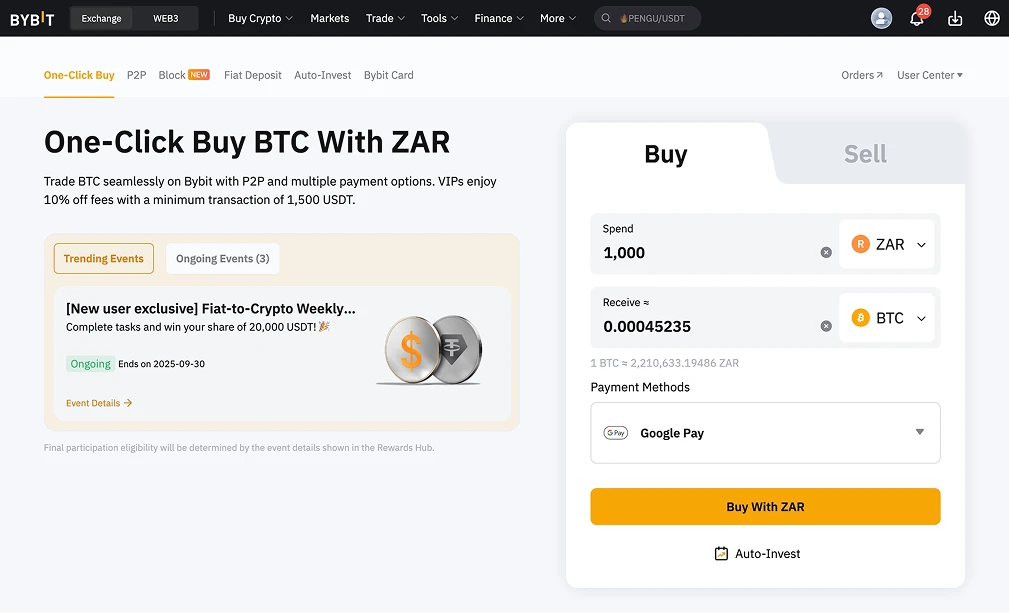
2. Binance
Binance is South Africa’s leading crypto exchange tailored specifically for institutional investors seeking deep liquidity and robust security. It supports over 500 cryptocurrencies with daily trading volumes regularly surpassing $50 billion, catering to more than 280 million users across 180+ countries.
Institutional traders enjoy advanced trading features, including extensive Spot, Margin, and Futures markets. It provides sophisticated trading infrastructure, offering API integrations and an OTC trading desk. Binance Earn allows users to generate attractive yields through staking and liquidity farming.
Security and compliance are central to Binance’s appeal. It employs stringent KYC procedures, multi-tier account authentication, and the Secure Asset Fund for Users (SAFU) to protect client funds. Additionally, Binance continuously validates its holdings through publicly verifiable proof-of-reserve audits.
Platform Highlights:
- Fees: Trading fees start from 0.1%, with volume-based institutional discounts.
- Supported Assets: 500+ cryptocurrencies.
- Regulation & Licensing: Operates as a Juristic Representative of FiveWest OTC Desk (Pty) Limited in South Africa (FSP 51619).
- ZAR Deposit Methods: Bank transfers, credit cards, debit cards.
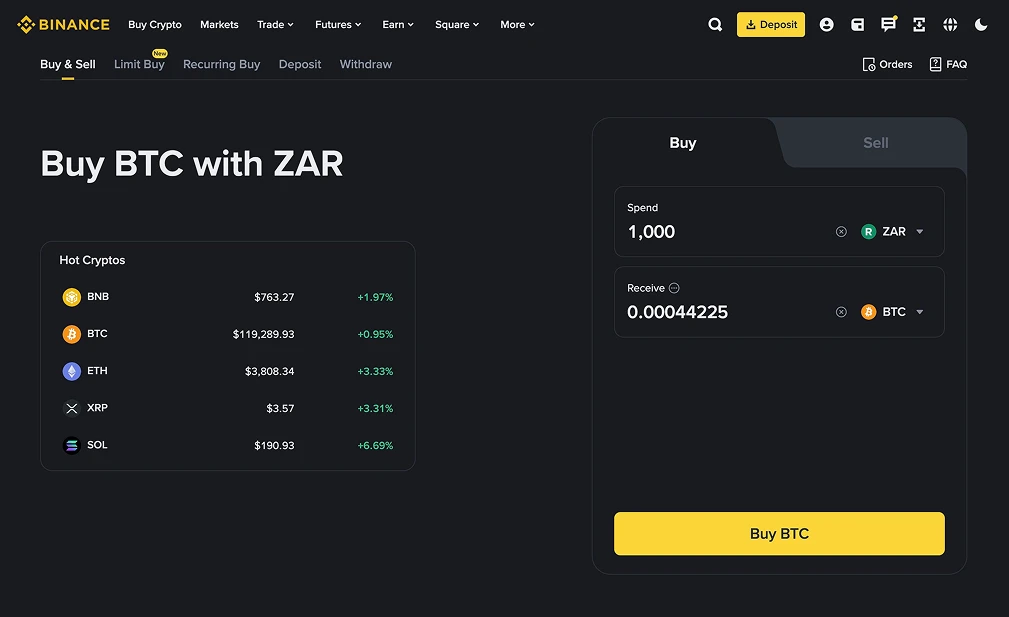
3. OKX
OKX is gaining traction among users interested in DeFi and Web3, providing advanced trading tools and extensive blockchain integration. With 30 million users in over 180 regions, it enables easy access to DeFi ecosystems, NFTs, perpetual futures trading with leverage, and crypto options strategies.
The exchange features deep integration with TradingView’s powerful charting software, automated strategies via trading bots and a copy trading service. It also provides an institutional-grade suite featuring ultra-low latency APIs, OTC liquidity networks, and secure sub-account management.
South African users can deposit ZAR to purchase crypto assets through widely accepted payment methods like Visa, Mastercard, Apple Pay, and bank transfers. OKX ensures user security through rigorous verification procedures, secure custodial wallets, and real-time market data feeds.
Platform Highlights:
- Fees: Maker fees start at 0.08%, and taker fees at 0.1%.
- Supported Assets: Over 340 cryptocurrencies.
- Regulation & Licensing: Provisional license under FSCA oversight.
- ZAR Deposit Methods: Credit cards, debit cards, Apple Pay, and bank transfers.
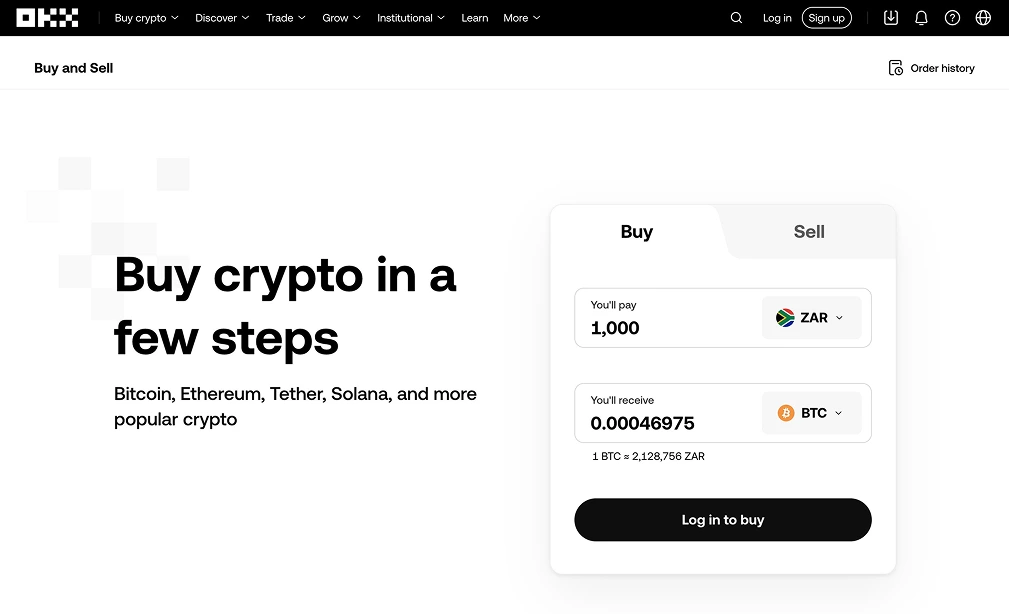
4. BloFin
BloFin is the preferred platform for privacy-conscious traders, renowned for its no-KYC trading environment. Designed for users who prioritize speed, discretion, and efficiency, the exchange delivers rapid trade execution and an intuitive, secure trading experience across spot and futures markets.
Users have access to powerful trading tools, including perpetual futures contracts, spot markets, and an automated Unified Trading Account equipped with AI-driven bots. Additionally, BloFin’s Copy Trading feature allows users to effortlessly mirror strategies from thousands of successful traders.
Security is at the forefront, with multi-layer asset protection and privacy-centric policies that keep user data secure without mandatory identity verification. BloFin also maintains a strong market presence through global events such as TOKEN2049 and the widely celebrated Whales Bash.
Platform Highlights:
- Fees: 0.02% maker fees, 0.06% taker fees.
- Supported Assets: Over 600 cryptocurrencies.
- Regulation & Licensing: Globally accessible with limited regulatory oversight due to its privacy-oriented framework.
- ZAR Deposit Methods: Credit cards, debit cards.
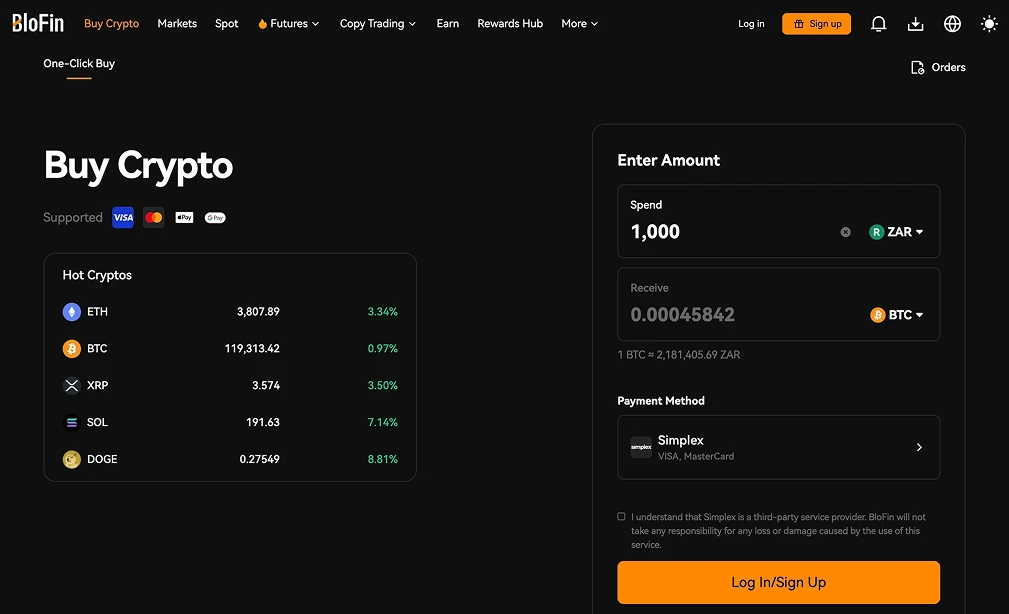
5. Gate
Gate has become a go-to crypto exchange in South Africa for traders interested in accessing one of the largest selections of cryptocurrencies globally. Trusted by over 32 million users worldwide, Gate provides seamless trading in more than 3,600 digital assets for spot and futures trading.
The platform’s trading offerings include spot markets, advanced futures contracts, leveraged tokens, and copy trading functionality. Gate also provides unique earning opportunities, including high-yield crypto staking and Simple Earn products, which offer attractive APRs of up to 11%.
GateToken (GT), the exchange’s native coin, further enriches user experience by unlocking discounted trading fees, special rewards, and early access to new token listings. It prioritizes user security with strict reserve audits, holding a remarkable total reserve ratio above 126%, ensuring transparency.
Platform Highlights:
- Fees: Competitive trading fees from 0.2%; discounted rates with GateToken (GT).
- Supported Assets: Over 3,600 cryptocurrencies.
- Regulation & Licensing: Not regulated in South Africa but remains accessible to residents.
- ZAR Deposit Methods: EFT bank transfers, credit cards, debit cards.
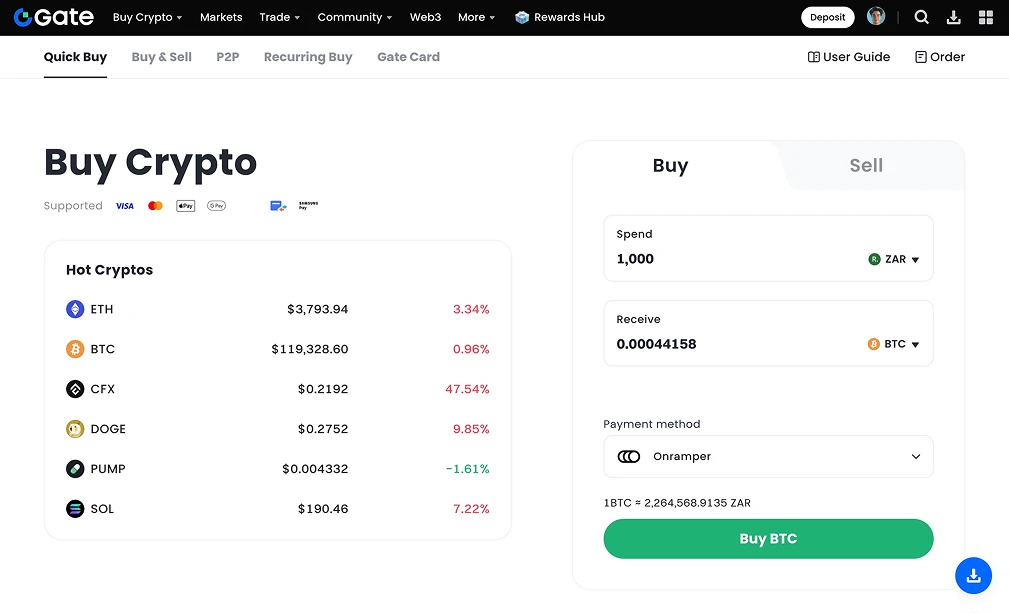
6. Luno
Luno is based in Johannesburg and considered the most trusted local exchange, recognized for its commitment to user safety, regulatory compliance, and straightforward investment tools. It offers an intuitive investment platform designed specifically with South African traders in mind.
The exchange emphasizes robust security and compliance, employing rigorous Know Your Customer (KYC) and Anti-Money Laundering (AML) processes. Investors can take advantage of unique features such as recurring buys, allowing automatic scheduled investments, and Ethereum staking.
Luno prioritizes education and transparency, offering extensive learning resources within its "Discover" section, where users receive guidance to inform their crypto investment decisions. Payments can conveniently be made in South African Rands (ZAR) through local deposit methods.
Platform Highlights:
- Fees: Transparent trading fees ranging from 0.1% to 0.25%.
- Supported Assets: Over 20 cryptocurrencies.
- Regulation & Licensing: Fully regulated and licensed financial services provider (FSP no. 53314) in South Africa.
- ZAR Deposit Methods: EFT bank transfers, debit cards, Google Pay (Android), and instant payment options.
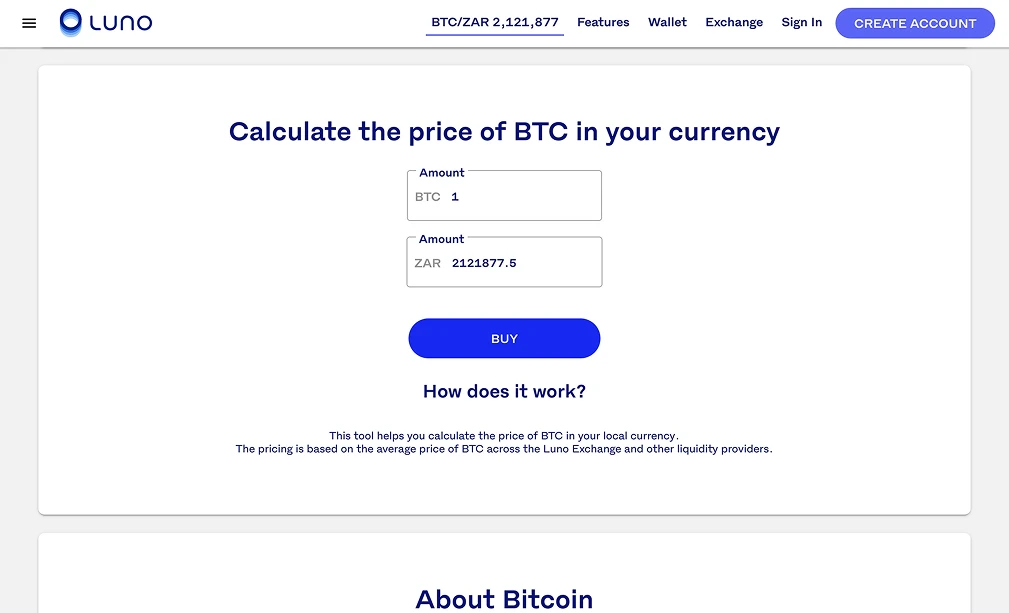
Is Crypto Regulated in South Africa?
Cryptocurrency regulation in South Africa is primarily overseen by the Financial Sector Conduct Authority (FSCA), which classifies crypto assets as financial products. Under this framework, Crypto Asset Service Providers (CASPs) must obtain formal licensing from the FSCA and comply fully with the Financial Intelligence Centre Act (FICA), requiring strict adherence to anti-money laundering (AML) and counter-terrorism financing (CTF) protocols.
In April 2025, Directive 9 was introduced, mandating identity verification and detailed reporting for crypto transactions exceeding ZAR 25,000, aligning the country more closely with global FATF standards. Lighter data rules apply for transfers under ZAR 5,000, but full due diligence is mandatory above this threshold or in high‑risk cases.
CASPs must develop and maintain Risk Management and Compliance Programmes, appoint compliance officers, conduct due diligence, monitor suspicious activity, and report to the FIC. Non‑compliance may trigger administrative sanctions under FICA Section 45C. Foreign investment platforms serving South African clients are also subject to these requirements.
How is Crypto Taxed in South Africa?
Cryptocurrency taxation in South Africa is governed by the South African Revenue Service (SARS), which classifies crypto as intangible financial assets. Depending on the usage, intention, and frequency of transactions, crypto activities are subject to different tax treatments. The main taxes applicable include:
- Capital Gains Tax (CGT): Applied when crypto assets are held primarily as investments and disposed of after longer holding periods. Individuals receive an annual exclusion of R40,000, with 40% of the remaining gain taxable at the individual's marginal income tax rate, resulting in an effective maximum rate of approximately 18%.
- Income Tax: Applicable to individuals and entities actively involved in frequent crypto trading, mining, staking, or receiving crypto as payment. Such profits or rewards are classified as ordinary income and taxed according to standard income tax brackets, which can reach up to 45%.
- Value-Added Tax (VAT): Cryptocurrency transactions themselves are exempt from VAT in South Africa. However, services related to crypto trading, such as brokerage or exchange fees charged by local service providers, may attract VAT at the standard rate of 15%.
Taxpayers must maintain detailed transaction records, including dates, crypto amounts, transaction types, and associated costs, to ensure accurate reporting. Non-compliance or failure to accurately declare cryptocurrency transactions can lead to penalties, interest charges, and potential audits by SARS.
Cryptocurrency Adoption in South Africa
Cryptocurrency adoption in South Africa is on a steady upward trajectory, supported by growing user engagement and a favorable market outlook. By 2026, the number of South African cryptocurrency users is projected to rise to approximately 7.05 million, increasing user penetration from 10.49% in 2025 to 10.77% the following year.
This growth stems from increased local exchange activity, higher participation from individual and institutional investors, clearer regulatory guidelines, and expanding awareness and adoption of digital assets among businesses and the general public.
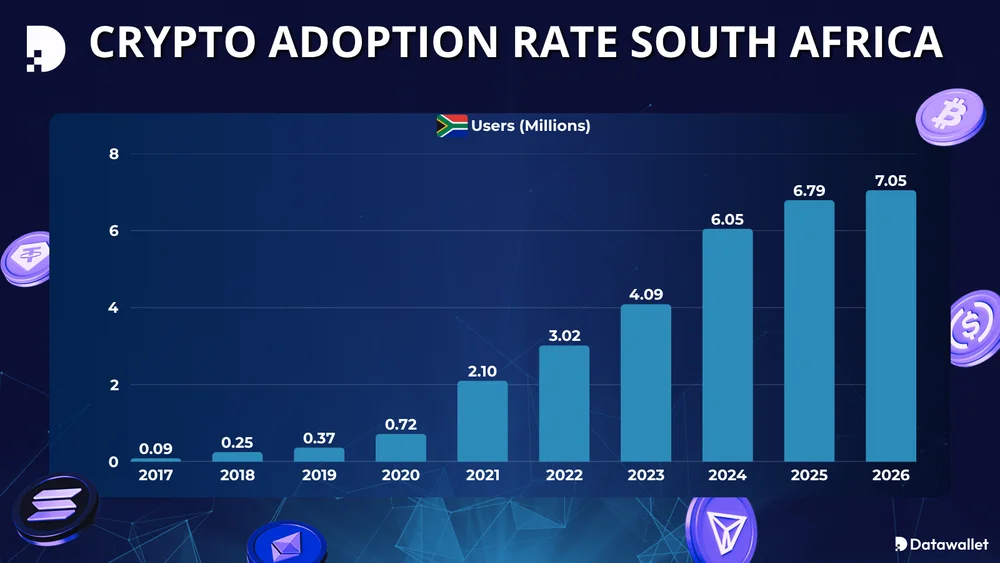
How to Buy Bitcoin in South Africa
South African investors interested in buying Bitcoin need to choose cryptocurrency exchanges that comply with guidelines set by the Financial Sector Conduct Authority (FSCA). Follow these steps to securely buy BTC in South Africa:
- Select Exchange: Pick a trusted exchange that adheres to FSCA regulations, such as Bybit, Binance, or Luno.
- Create Account: Sign up on your selected exchange and complete the mandatory Know Your Customer (KYC) process. You’ll typically need to provide official identification, including your South African ID card, driver’s license, or passport.
- Deposit Funds in ZAR: Fund your account using South African Rand (ZAR). Popular exchanges generally accept deposits through EFT bank transfers or cards.
- Buy Bitcoin: With your account funded, navigate to the Bitcoin trading section. Enter the amount in ZAR or the specific Bitcoin value you wish to purchase, then confirm your transaction.
Once your Bitcoin purchase is finalized, immediately transfer your cryptocurrency to a secure, private wallet. A hardware wallet or a well-reviewed software wallet is highly recommended, offering enhanced security and full control over your crypto assets.
Final Thoughts
Choosing the right crypto exchange in South Africa ultimately depends on your individual priorities, such as privacy, asset variety, or advanced trading options. Prioritize platforms compliant with FSCA regulations, like Bybit or Luno, to maximize security and ensure regulatory protection.
Carefully consider your personal investment goals, risk tolerance, and preferred trading methods before making your choice. Staying informed on South African regulatory updates and maintaining accurate tax records will further safeguard your crypto journey, helping you trade confidently and responsibly.
Frequently asked questions
What is the safest way to store crypto in South Africa?
The safest way to store cryptocurrency is by using a reputable hardware wallet such as Ledger or Trezor. These wallets provide offline cold storage, minimizing exposure to hacks or breaches that online wallets face.
Can I use international crypto exchanges from South Africa?
Yes, South Africans can legally use international crypto exchanges. However, it's important to ensure these exchanges comply with FSCA regulations and support convenient ZAR deposit methods to avoid additional currency conversion fees.
Are crypto gains taxed even if I don't withdraw to my bank account?
Yes, cryptocurrency transactions, including trading one crypto asset for another, are taxable events in South Africa. SARS requires taxpayers to report all realized gains or losses annually, even if funds remain within the exchange.
How secure are mobile crypto trading apps in South Africa?
Leading exchanges like Binance, Luno, and Gate offer mobile apps on iOS and Android with strong security features including two-factor authentication (2FA), device whitelisting, and biometric login options. Binance also provides SAFU fund protection and proof-of-reserves audits.
%2520(1).webp)
Written by
Antony Bianco
Head of Research
Antony Bianco, co-founder of Datawallet, is a DeFi expert and active member of the Ethereum community who assist in zero-knowledge proof research for layer 2's. With a Master’s in Computer Science, he has made significant contributions to the crypto ecosystem, working with various DAOs on-chain.

.webp)

.webp)
.webp)




